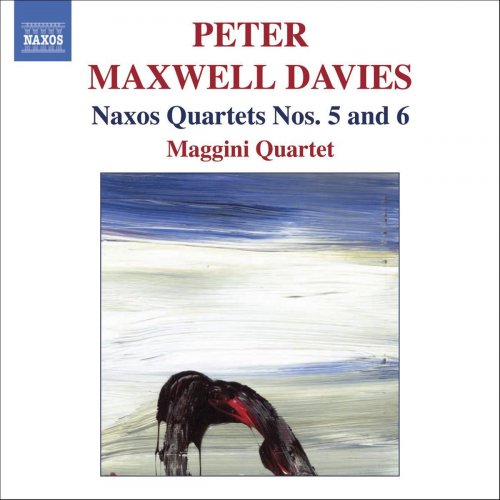
Maggini Quartet - Peter Maxwell Davies: Naxos Quartets Nos. 5 & 6 (2006)
BAND/ARTIST: Maggini Quartet
- Title: Peter Maxwell Davies: Naxos Quartets Nos. 5 & 6
- Year Of Release: 2006
- Label: Naxos
- Genre: Classical
- Quality: flac lossless (tracks) +Booklet
- Total Time: 00:55:38
- Total Size: 212 mb
- WebSite: Album Preview
Tracklist
01. Naxos Quartet No. 5 - Lighthouses of Orkney and Shetland: I. Largo
02. Naxos Quartet No. 5 - Lighthouses of Orkney and Shetland: II. Lento
03. Naxos Quartet No. 6: I. Allegro
04. Naxos Quartet No. 6: II. Allegro moderato (Dominica Tertia Adventus Antiphona)
05. Naxos Quartet No. 6: III. Presto
06. Naxos Quartet No. 6: IV. Adagio molto
07. Naxos Quartet No. 6: V. Andante (in Die Nativitatis)
08. Naxos Quartet No. 6: VI. Allegro
The ten Naxos String Quartets of Peter Maxwell Davies were commissioned by the label as a series, to be performed and recorded by the Maggini Quartet and issued in five volumes. One might have supposed that Maxwell Davies would have resorted to using Classical quotations and parodies, since the practice of composing string quartets in sets hearkens back to the publishing practices of the late 18th century. That fact is probably not lost on this wry composer, who has built a career on borrowing heavily from the past, and he might well have made it a point of musical commentary. Even so, any associations here are subtle, not boldly pronounced, and there are no blatant references to the legacy of Haydn, Mozart, and Beethoven to jolt the listener. It is still possible to discern in these compositions a sense of the great quartet tradition, at work structurally through their independent voices and balanced formal designs, yet conveyed in sound by way of modernist harmonies, modified tonality, and extended instrumental techniques. The Naxos Quartet No. 5, "Lighthouses of Orkney and Shetland" (2004) may superficially resemble a skittish Expressionist work of the Second Viennese School, despite being cast in two slow, well-proportioned movements of compelling mystery; and for all its underlying connections to Gregorian chants, the Naxos Quartet No. 6 (2005) may bring late Beethoven to mind in its episodic format and sudden contrasts. But above all these considerations, Maxwell Davies has deeply personal things to express, and the private, introspective moods of both pieces seem to rule out public posturing or postmodernist game-playing; that is perhaps why these string quartets are quietly allusive rather than overtly stated, and the satirical vein is left untapped. The Maggini Quartet is alert to all the nuances and subtleties, and the ensemble's concentrated efforts make these performances feel fresh and spontaneous, even though they must have been intensively rehearsed to be so authoritatively executed. The reproduction is clear and vibrant, in every way up to Naxos' usual high standards.
01. Naxos Quartet No. 5 - Lighthouses of Orkney and Shetland: I. Largo
02. Naxos Quartet No. 5 - Lighthouses of Orkney and Shetland: II. Lento
03. Naxos Quartet No. 6: I. Allegro
04. Naxos Quartet No. 6: II. Allegro moderato (Dominica Tertia Adventus Antiphona)
05. Naxos Quartet No. 6: III. Presto
06. Naxos Quartet No. 6: IV. Adagio molto
07. Naxos Quartet No. 6: V. Andante (in Die Nativitatis)
08. Naxos Quartet No. 6: VI. Allegro
The ten Naxos String Quartets of Peter Maxwell Davies were commissioned by the label as a series, to be performed and recorded by the Maggini Quartet and issued in five volumes. One might have supposed that Maxwell Davies would have resorted to using Classical quotations and parodies, since the practice of composing string quartets in sets hearkens back to the publishing practices of the late 18th century. That fact is probably not lost on this wry composer, who has built a career on borrowing heavily from the past, and he might well have made it a point of musical commentary. Even so, any associations here are subtle, not boldly pronounced, and there are no blatant references to the legacy of Haydn, Mozart, and Beethoven to jolt the listener. It is still possible to discern in these compositions a sense of the great quartet tradition, at work structurally through their independent voices and balanced formal designs, yet conveyed in sound by way of modernist harmonies, modified tonality, and extended instrumental techniques. The Naxos Quartet No. 5, "Lighthouses of Orkney and Shetland" (2004) may superficially resemble a skittish Expressionist work of the Second Viennese School, despite being cast in two slow, well-proportioned movements of compelling mystery; and for all its underlying connections to Gregorian chants, the Naxos Quartet No. 6 (2005) may bring late Beethoven to mind in its episodic format and sudden contrasts. But above all these considerations, Maxwell Davies has deeply personal things to express, and the private, introspective moods of both pieces seem to rule out public posturing or postmodernist game-playing; that is perhaps why these string quartets are quietly allusive rather than overtly stated, and the satirical vein is left untapped. The Maggini Quartet is alert to all the nuances and subtleties, and the ensemble's concentrated efforts make these performances feel fresh and spontaneous, even though they must have been intensively rehearsed to be so authoritatively executed. The reproduction is clear and vibrant, in every way up to Naxos' usual high standards.
As a ISRA.CLOUD's PREMIUM member you will have the following benefits:
- Unlimited high speed downloads
- Download directly without waiting time
- Unlimited parallel downloads
- Support for download accelerators
- No advertising
- Resume broken downloads


